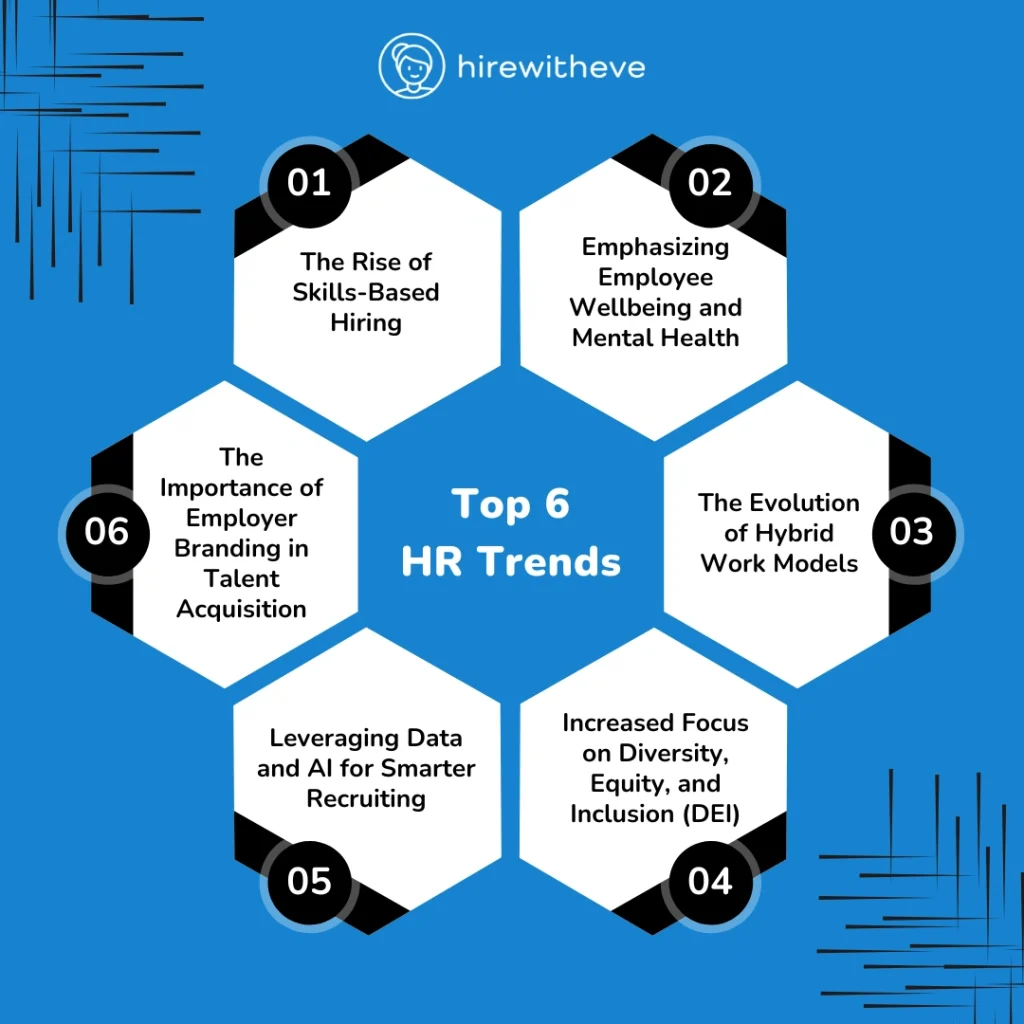Top 6 HR Trends to Look for in 2025

As we move into 2025, HR professionals and talent acquisition specialists are gearing up for a year full of transformation and adaptation. The ongoing shifts in the workplace, spurred by technological advancements, changes in employee expectations, and global economic trends, are redefining the future of human resources.
To stay ahead, it’s crucial to understand the HR trends to look for in the upcoming year. From the rise of skills-based hiring to the growing emphasis on mental health and diversity, here’s what to expect in 2025.
The Role of Technology in HR Transformation
One of the driving forces behind the major HR trends to look for in 2025 is the rapid adoption of new technologies. The integration of HR technology has significantly reshaped the way human resources departments operate, enabling them to streamline processes, enhance candidate experience, and optimize decision-making.
Cloud-based HR platforms, AI-powered recruitment tools, and advanced analytics are not just improving efficiency but are also helping HR teams make more informed, data-driven decisions. These technologies are allowing HR professionals to automate administrative tasks, freeing up time to focus on strategic initiatives like employee engagement and diversity programs.
Moreover, the growing presence of AI in recruitment — whether through candidate matching algorithms or automated interview processes — offers solutions to some of the challenges that HR professionals will face in 2025. This technological transformation makes it easier to adopt other HR trends to look for in 2025, such as skills-based hiring and DEI initiatives.
With technology continuing to drive change, staying informed and embracing innovation will be key for HR managers and talent acquisition specialists. Those who leverage HR technology effectively will be well-positioned to attract top talent, improve retention, and create more inclusive work environments in 2025.
What are the Top 6 HR Trends to Look for in 2025?

Trend 1: The Rise of Skills-Based Hiring
One of the most significant HR trends to look for in 2025 is the widespread adoption of skills-based hiring. As companies shift their focus from degrees and titles to specific skills, the hiring landscape is evolving rapidly. This approach not only opens up opportunities for a broader talent pool but also ensures that the right candidates are matched to the right jobs. Skills-based hiring is particularly beneficial in fields where practical experience and competency are more valuable than formal education.
For talent acquisition specialists, this trend demands a revamp of recruitment strategies. Instead of relying on traditional resumes, hiring managers are now prioritizing assessments and real-world challenges to evaluate candidates. Platforms that integrate skills assessments into the hiring process are becoming essential tools in the HR toolkit.
Trend 2: Emphasizing Employee Wellbeing and Mental Health
Another critical HR trend to look for in 2025 is the focus on employee well-being, particularly mental health. With increasing awareness of mental health issues, employers are more committed to creating a supportive work environment. Companies are implementing wellness programs, offering flexible work schedules, and providing mental health resources to ensure employees feel valued and supported.
According to recent surveys, 85% of employees believe that mental health support is crucial for job satisfaction and retention. As a result, HR managers are being proactive in introducing initiatives that prioritize mental and emotional well-being. In 2025, organizations will be expected to maintain a robust framework for supporting their employees’ overall well-being, both inside and outside the workplace.
Trend 3: The Evolution of Hybrid Work Models
Hybrid work models are not a new concept, but they continue to evolve as one of the key HR trends to look for in 2025. As companies find a balance between in-office and remote work, the hybrid model is becoming the norm rather than the exception. However, it’s not without its challenges. HR managers need to ensure that hybrid work setups are both efficient and equitable for all employees.
The focus is shifting toward refining communication, collaboration, and team-building strategies that work in a hybrid environment. By creating seamless experiences across physical and virtual spaces, HR leaders can foster better team cohesion and productivity, regardless of location. Employee engagement platforms and collaborative tools are essential to making hybrid work models successful in 2025.
Trend 4: Increased Focus on Diversity, Equity, and Inclusion (DEI)
Diversity, Equity, and Inclusion (DEI) have long been priorities in the workplace, but 2025 will see an even greater emphasis on these values. One of the most critical HR trends to look for is how companies embed DEI into their hiring and retention strategies. Beyond meeting quotas, organizations are expected to foster environments where diversity can thrive at all levels of the business.
In practice, this means actively working to eliminate bias from hiring processes, creating mentorship opportunities for underrepresented groups, and offering training on inclusivity for employees and leadership. Organizations that embrace DEI as a core component of their culture are more likely to attract top talent and retain their workforce.
Trend 5: Leveraging Data and AI for Smarter Recruiting
Data-driven recruitment and the integration of AI technology are among the top HR trends to look for in 2025. The growing use of data analytics is transforming how HR departments make decisions. With AI-powered tools, companies can now automate many recruitment tasks, such as candidate sourcing, screening, and even interview scheduling.
AI-driven recruitment solutions enable HR professionals to gather deeper insights into candidate performance and predict future success in a role. By leveraging data, HR teams can make more informed, unbiased decisions, ultimately improving the quality of hires and reducing time-to-hire. As more organizations adopt AI in their hiring processes, the recruitment landscape will continue to become more efficient and strategic.
Trend 6: The Importance of Employer Branding in Talent Acquisition
As competition for top talent intensifies, building a strong employer brand is one of the key HR trends to look for in 2025. Candidates today are not just looking for a paycheck; they want to work for organizations that align with their values and offer meaningful career opportunities. Employer branding plays a crucial role in attracting and retaining top talent, especially in a competitive job market.
HR teams will need to collaborate closely with marketing and leadership to ensure the company’s values, culture, and mission are communicated to potential candidates. From social media presence to employee testimonials, a strong employer brand can make all the difference when it comes to standing out from the competition.
Conclusion
As 2025 approaches, talent acquisition specialists and HR managers need to stay ahead of the curve by recognizing the HR trends to look for. These trends — from skills-based hiring and hybrid work models to AI-driven recruitment and DEI initiatives — are transforming how organizations attract, hire, and retain their workforce.
To effectively navigate these trends, platforms like HirewithEve.ai are invaluable. By offering features that support skills-based hiring, AI-driven recruitment, and a focus on diversity and inclusion, HirewithEve.ai helps organizations keep pace with the evolving HR landscape. With tools designed to streamline the hiring process and provide deeper insights into candidate performance, HirewithEve.ai is the go-to solution for HR professionals who want to stay ahead in 2024.
Whether you’re optimizing your recruitment strategies or building a strong employer brand, keeping up with the HR trends to look for in 2025 will be key to ensuring long-term success.
